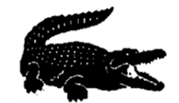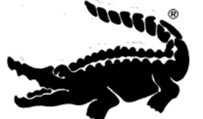Lacoste says no space for two crocodiles
The case involves a trademark dispute between Lacoste and Crocodile International Pte Ltd. over the use of a crocodile device on clothing articles. Lacoste initiated the lawsuit to protect their copyright and trademark rights in the crocodile device, which they claim is being infringed upon by Crocodile International. Lacoste in the lawsuit seeks a permanent injunction to restrain Crocodile International from further use of the impugned mark. Lacoste also requested ancillary reliefs, including an order for Crocodile International to provide access to their financial accounts for assessment of damages.
Lacoste’s Case:
- Trademark and Copyright Ownership: Lacoste, founded by the renowned tennis player Jean René Lacoste, is internationally acclaimed for their clothing articles adorned with the “LACOSTE” mark and a crocodile device
 . The company has registered trademarks for the crocodile device in various countries, including India. The first trademark filing for the crocodile device dates to April 27, 1933, in France. In India, the copyright in the artwork of the crocodile device remains with Lacoste, and the artistic work was registered in favour of Lacoste under No. 62692/2002.
. The company has registered trademarks for the crocodile device in various countries, including India. The first trademark filing for the crocodile device dates to April 27, 1933, in France. In India, the copyright in the artwork of the crocodile device remains with Lacoste, and the artistic work was registered in favour of Lacoste under No. 62692/2002. - Exclusive Rights: Lacoste claims exclusive statutory rights to use the crocodile device in connection with the goods for which they are registered. Lacoste claimed these trademarks have been extensively used in India since October 1993 through their licensee, Sports and Leisure Apparel Ltd. Lacoste provided annual sales figures and promotional expenditures for the products bearing the “LACOSTE” mark and crocodile device since 1993.
- Infringement by Crocodile International: Crocodile International’s use of a similar crocodile device
 on their clothing articles constitutes trademark infringement and passing off. The impugned mark, which is affixed on pockets of shirts and t-shirts without the brand name “Crocodile,” mirrors the manner in which Lacoste uses their registered crocodile device, thus heightening the risk of consumer confusion.
on their clothing articles constitutes trademark infringement and passing off. The impugned mark, which is affixed on pockets of shirts and t-shirts without the brand name “Crocodile,” mirrors the manner in which Lacoste uses their registered crocodile device, thus heightening the risk of consumer confusion. - Misrepresentation: Crocodile International by using the symbol ‘®’ alongside the impugned mark, despite the lack of its independent registration, amounts to misrepresentation.
- Breach of 1983 Agreement: Crocodile International has breached a previously agreed-upon understanding regarding peaceful co-existence in the Asian countries. According to Lacoste, the 1983 Agreement, whereunder both parties agreed to concurrent usage of certain trademarks in various territories, does not extend to India. Moreover, the 1983 Agreement does not authorize Crocodile International to use the crocodile device without the word “CROCODILE”.
- Legal Action: Lacoste initiated the legal action seeking a permanent injunction to restrain Crocodile International from further use of the impugned mark. They also seek ancillary reliefs, including an order for Crocodile International to provide access to their financial accounts for assessment of damages.
Crocodile International’s Defence:
- Original Creation and Use: The “CROCODILE” trademark was originally devised, created, and adopted by Dato Dr. Tan Hian Tsin, the founder of Crocodile International, in 1947 in Singapore. Since then, Crocodile International has continuously and extensively used both the “CROCODILE” word and device marks.
- International Recognition: Crocodile International is an internationally renowned company, recognized for their superior quality products under the mark/name “CROCODILE.” They have utilized the “CROCODILE” trademark and crocodile device across a diverse range of products, including clothing, accessories, sports equipment, eyewear, travel ware, and timepieces.
- Trademark Registrations: The “CROCODILE” trademark was first registered in Singapore in 1949, followed by registrations in several other countries, including Malaysia, Indonesia, Japan, Korea, and India.
- Peaceful Co-existence Agreement: Crocodile International argued that Lacoste has breached a previously agreed-upon understanding regarding peaceful co-existence in the Asian countries. They claim that this agreement should extend to the Indian territory as well.
- Use of the Crocodile Device: Crocodile International maintained that their use of the crocodile device is legitimate and does not infringe upon Lacoste’s trademark rights. They argue that the 1983 agreement between the parties allows them to use the crocodile device in India.
Key Issues:
- Territorial Jurisdiction: Whether the court has the jurisdiction to entertain and try the present suit.
Ownership of Copyright: Whether Lacoste is the owner of the copyright in the crocodile device. - Proprietorship of the Crocodile Device: Whether Lacoste is the proprietor of the crocodile device in India by virtue of registrations and use.
- Prior Adoption and Use: Whether Crocodile International is the prior adopter and user of the crocodile device and the owner of trademark rights in the same.
- Agreement of 1983: Whether the 1983 agreement between the parties allows Crocodile International to use the crocodile device in India.
Court’s findings:
- Territorial Jurisdiction: Lacoste have a significant presence and business operations in India, and the alleged infringement by Crocodile International also took place within the Indian territory. The court ruled that Section 62(2) of the Copyright Act authorizes initiation of legal proceedings before the court within whose territorial limits the Plaintiff resides or carries on business or personally works for gain. Thus, the court found that it has the jurisdiction to entertain and try the present suit.
- Ownership of Copyright: The court determined that Lacoste is the owner of the copyright in the crocodile device. The artistic work was registered in favor of Lacoste under No. 62692/2002, granting them exclusive rights in India. The application for registration filed on 09th June 1999 by Plaintiff No. 1 and the certificate, explicitly record the initial publication date of 1927 in France, and a subsequent publication in India in 1992, reinforcing the work’s continuous recognition and protection under copyright laws.
- Proprietorship of the Crocodile Device: The court found that Lacoste is the proprietor of the crocodile device in India by virtue of registrations and use. Lacoste has registered trademarks for the crocodile device in various countries, including India.
- Prior Adoption and Use: The court concluded that Crocodile International is not the prior adopter and user of the crocodile device in India. Lacoste’s use of the crocodile device predates Crocodile International’s use in India. Lacoste provided annual sales figures and promotional expenditures for products bearing the “LACOSTE” mark and crocodile device since 1993 to substantiate their assertion of extensive use.
- Agreement of 1983: The court found that the 1983 agreement between the parties does not extend to India. The agreement does not authorize Crocodile International to use the crocodile device without the word “CROCODILE” in India. The court examined the historical backdrop to the execution of the 1983 agreement, the co-existence framework established and the geographical limitations and interpretations of the agreement. The court noted that the 1983 agreement was intended to establish a framework for the peaceful co-existence of the parties’ respective crocodile devices in various territories. However, the court found that the agreement did not explicitly extend to India. Furthermore, the court considered the probative value of contemporaneous documents and the significance of these documents to the merits of the case. The court concluded that the 1983 agreement, along with the contemporaneous documents, did not authorize Crocodile International to use the crocodile device in India without the word/mark “CROCODILE”.
- Trademark infringement: The Court held that Crocodile International’s use of a similar crocodile device constitutes trademark infringement as it bears a deceptive and confusing similarity to Lacoste’s registered trademark.
- No passing off: The Court held that Crocodile International’s actions did not constitute passing off of Lacoste’s trademarks as it failed to establish the necessary reputation and consumer recognition of their trademarks in India at the time Crocodile International began using a similar mark.
Considering the above findings, the court granted a permanent injunction restraining Crocodile International from using the crocodile device in India. The court also ordered Crocodile International to provide access to their financial accounts for assessment of damages.



